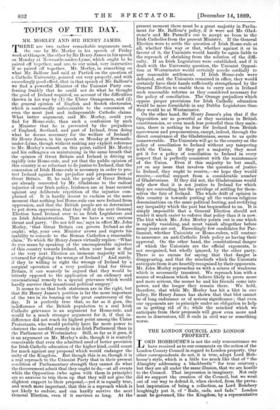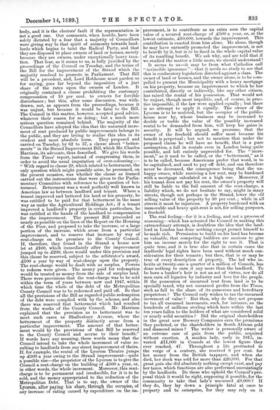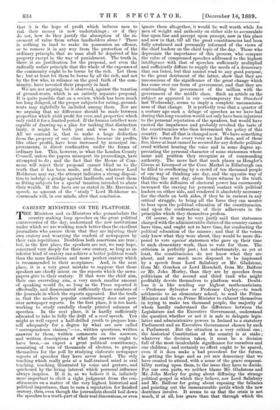THE LONDON COUNCIL AND LONDON PROPERTY.
TORD HOBHOUSE'S is not the only remonstrance we have received as to our comments on the action of the London County Council in regard to London property. Our other correspondents do not, it is true, adopt Lord Hob- house's style, which is a little too much like that of " the Almighty addressing a blackbeetle " for true courtesy ; but they are all under the same illusion, that we are hostile to the Council. That impression is imaginary. Not only did we support the creation of the Council, but we went out of our way to defend it, when elected, from the preva- lent impUtation of being a collection, as Lord Rosebery laughingly put it, of " Rads, cads, and fads." London must be governed, like the Kingdom, by a representative body, and it is the electors' fault if the representation is not a good one. Our comments, when hostile, have been solely dictated by a fear that a majority of Councillors were giving way to that spirit of animosity towards land- lords which begins to taint the Radical Party, and that they are disposed to place owners of land or houses, merely because they are owners, under exceptionally heavy taxa- tion. That fear, as it seems to us, is fully justified by the proceedings of the Council on Tuesday, and the terms of the Bill for the improvement of the Strand which the majority resolved to promote in Parliament. That Bill will be a precedent, and, Lord Hobhouse must pardon us for saying, goes far beyond the imposition of a just share of the rates upon the owners of London. It originally contained a clause prohibiting the customary compensation of 10 per cent. to owners for forcible disturbance ; but this, after some discussion, was with- drawn, not, as appears from the proceedings, because it was unjust, but because it would be fatal to the Bill. The Council in this matter, however, accepted good advice, whatever their reason for so doing ; but a much more serious question remained behind. The majority of the Councillors have adopted the idea that the unearned incre- ment of rent produced by public improvements belongs to the public, and they are trying to realise this idea in its crudest and most absolute form. They proposed and carried on Tuesday, by 62 to 37, a clause about " better- ments " in the Strand Improvement Bill, which Mr. Charles Harrison, its advocate, thus described. We give his words from the Times' report, instead of compressing them, in order to avoid the usual imputation of over-colouring :— " With regard to clause 29, which related to betterment, the only question which might possibly arise, he presumed, on the present occasion, was whether the clause as framed carried out the instructions that were given to the Parlia- mentary Committee with reference to the question of bet- terment. Betterment was a word perfectly well known in American law as between landlord and tenant. Where a tenant improved and bettered his land or his property, he was entitled to be paid for that betterment in the same way as under the Agricultural Holdings Act ; if a tenant improved a landlord's property in certain particulars, he was entitled at the hands of the landlord to compensation for the improvement. The present Bill proceeded as nearly as possible on the lines of the Report on the Housing of the Poor, and proposed to take the increase, or a large portion of the increase, which arose from a particular improvement, and to reserve that increase by way of rent-charge on the premises to the County Council. If, therefore, they found in the Strand a house now let at £100, which immediately after the improvement jumped up to £200, there would under this provision and this clause be reserved, subject to the arbitrator's award, £100 a year by way of rent-charge upon the property. The rent-charge would be dealt with as surplus. Powers to redeem were given.. The money paid for redemption would be treated as money from the sale of surplus land. There were provisions that the rent-charge was to be sold within the term of years between now and 1947, within which time the whole of the debt of the Metropolitan County Council was to be redeemed and paid off. So that all the provisions of the Bill as regarded public redemption of the debt were complied with by the scheme, and also there was reserved that betterment which had resulted from the works of the County Council. Mr. Harrison explained that the provision as to betterment was to meet such cases as Shaftesbury Avenue, where the betterment of the property distinctly arose from a particular improvement. The amount of that better- ment would by the provisions of that Bill be reserved to the County Council and accrue to their benefit." If words have any meaning, these words mean that the Council intend to take the whole increment of value re- sulting to landlords from any street improvement of theirs. If, for example, the rental of the Lyceum Theatre jumps up £500 a year owing to the Strand improvement—quite a possible rise—the proprietor of the Lyceum is to give the Council a rent-charge on the building of £500 a year, or, in other words, the whole increment. Moreover, this rent- charge is to be permanent and irreducible, for it is to be sold, and the money appropriated to the reduction of the Metropolitan Debt. That is to say, the owner of the Lyceum, after paying his share, through the occupier, of any increase of rating caused by expenditure on the im- provement, is to contribute as an extra sum the capital value of a secured rent-charge of £500 a year, or, at the lowest estimate, £10,000, towards the improvement. This contribution is exacted from him alone. He alone, though he may have earnestly promoted the improvement, is not to benefit by it, but is to be fined in the whole capital value of its resulting benefit. We ask why, and are told that if we studied the matter a little more, we should understand !
It seems to us—it may be from what Catholics call " invincible ignorance "—that it needs no study to see that this is confiscatory legislation directed against a class. The owner of land or houses, and the owner alone, is to be com- pelled to present the Municipality with a heavy mortgage on his property, because an improvement to which he has contributed, directly or indirectly, like any other citizen, has raised the rental of his possession. That would not be unjust, though most impolitic, and, of course, in prac- tice impossible, if the law were applied equally ; but there is no attempt to apply it equally. The owner of the Lyceum is to be mulcted, but the occupier of the public- house near by, whose business may be increased to double or treble the value of the possibly increased rental to be demanded from him, will keep his gains in security. It will be argued, we presume, that the owner of the freehold should suffer most because his benefit is perpetual ; but not to mention that under the proposed clause he will have no benefit, that is a pure assumption, a fall in rentals even in London being quite possible, and left entirely unprovided for. The " incre- ment," as it used to be called, or the " betterment," as it is to be called, because Americans prefer that word, is to be capitalised, and used to pay off debt, and can therefore never be decreased, the consequence being that the un- happy owner, while receiving a low rent, may be burdened with a mortgage calculated on a high one. Moreover, if his tenant does not pay his rent, the owner's property will still be liable to the full amount of the rent-charge, a liability which, we do not hesitate to say, might in many streets, though not perhaps in the Strand, lower the old selling value of the property by 30 per cent. ; while in all streets it must be injurious. A property burdened with an immovable and heavy quit-rent is not, for selling purposes, a freehold.
The real feeling—for it is a feeling, and not a process of reasoning—which has actuated the Council in making this extraordinary attempt, is doubtless the idea that the land- lord in London has done nothing except permit himself to be made rich. Permission to build on his land has become so valuable, that competing builders are anxious to give him an income merely for the right to use it. That is quite true, and it is true also that in certain cases the landlords' legal rights have been used without much con- sideration for their tenants ; but then, that is or may be true of every description of property. The lad who in- herits at twenty-one a quarter of a million of Consols, has done nothing to earn it any more than the landlord. To be born a banker's heir is not an act of virtue, nor do all men earn all legacies by industry and love for the people. If the possession of unearned rent from land is to be specially taxed, why not unearned profits from the Times, such as fall to the share of its numerous and hereditary proprietors ? The Council only wishes to tax the unearned increment of value ? But then, why do they not propose to tax all unearned increments, such, for instance, as the hundreds of millions sterling which have within the last ten years fallen to the holders of what are considered solid or nearly solid securities ? Did the original shareholders in the great new Brewery Companies earn the premiums they pocketed, or the shareholders in South African gold and diamond mines ? The writer is personally aware of an extreme case of gain from the public, acquired without exertion. A maiden lady, early in 1815, in- vested £11,000 in Consols at the lowest figure they ever reached, 47. Throughout a life protracted to the verge of a century, she received 6 per cent. for her money from the British taxpayer, and when she died, her stock was sold for more than £20,000. For that great gain she did absolutely nothing except exist, and pay her taxes, which functions are also performed unresistingly by the landlords. Do those who uphold the Council's pro- posal think it would be right, supposing it possible, for the community to take that lady's unearned £9,000 ? If they do, they lay down a principle fatal at once to property and to enterprise, for they may rely on it that it is the hope of profit which induces men to risk their money in new undertakings ; or if they do not, how do they justify the absorption of the in- crement of value from urban landholders alone ? There is nothing in land. to make its possession an offence, or to remove it in any way from the protection of the ordinary principle, that no man shall be deprived of his property except in the way of punishment. The truth is, there is no justification for the proposal, not even the radically unfair principle that the whole of the expenses of the community ought to be borne by the rich. Let them be ; but at least let them be borne by all the rich, and not by the few who, in reliance on the good faith of the com- munity, have invested their property in land.
We are not arguing, be it observed, against the taxation of ground-rents, which is an entirely separate proposal. It is quite possible that on a review, which has been much too long delayed, of the proper subjects for rating, ground- rents may rightfully be included among them. Nor are we arguing that no difference should be made between properties which yield profit for ever, and properties which only yield it for a limited period. If the human intellect were capable of drawing up a plan for making that distinction fairly, it might be both just and wise to make it. All we contend is, that to make a huge deduction from the property of one class alone, because its profits, like other profits, have been increased by muncipal im- provements, is direct confiscation under the forms of ordinary law. This, however, is what the London County Council, unless the papers misreport its proceedings, have attempted to do ; and the fact that the House of Com- mons will reject their proposal cannot blind us to the truth that it has been made, and that, whatever Lord Hobhouse may say, the attempt indicates a strong disposi- tion to indulge a grudge against landlords, and treat them as fitting subjects for a special taxation intended to abate their wealth. If the facts are as stated in Mr. Harrison's speech, no amount of the " study " Lord Hobhouse re- commends will, in our minds, alter that conclusion.












































 Previous page
Previous page